A 17-year-old girl presented to the ED with abdominal pain, nausea, and blood in her stool.
Her workup was unremarkable aside from hypokalemia.
She was discharged and told to follow-up with her PCP.
On December 10, she saw her pediatrician, Dr. Y.
Repeat labs were ordered, and her potassium was 2.9.
Dr. Y prescribed supplemental potassium for 14 days.
She told the patient to call back for a follow-up appointment and lab recheck after finishing the potassium.
On December 24, the patient presented to the ED at an academic pediatric hospital with abdominal pain and heavy menses.
A pediatric resident (now a pediatric heme/onc specialist) and an attending PEM-trained physician saw her.
Her potassium was 2.5.
She was also noted to be anemic (exact lab value not disclosed in court documents).
The patient was kept in the ED for several hours.
A repeat potassium was done and was 2.7.
She was advised to eat potassium-rich foods.
Zofran was prescribed for nausea and she was discharged home.
12 days later on January 5, the patient suffered a cardiac arrest and died.
It’s the 3 year anniversary of the newsletter!
Join thousands of doctors on the email list.
The patient had a challenging social situation, and her grandmother was her guardian.
The grandmother contacted a law firm, and a lawsuit was filed.
They sued the pediatrician, her employer, and the hospital system.
They did not specifically name the attending PEM physician nor the resident.
The plaintiff disclosed multiple experts including a PEM physician, pediatrician, pediatric nephrologist, and a pathologist.
Their expert opinions all have nearly-identical wording.
The PEM expert’s opinion is shown here:
The nephrologist’s opinion added the following statement, tying the hypokalemia to her cardiac arrest:
The pathologist’s opinion was summarized by the plaintiff’s attorney in court filings.
It indicates an autopsy was done but does not give any further details.
Dr. Y’s attorneys filed a special defense, noting that the patient did not follow the medical advice she was given:
The plaintiff offered to settle for $5,000,000 from the pediatrician and her employer, and $10,000,000 from the hospital.
Unfortunately, the plaintiff (the patient’s grandmother) died shortly after the lawsuit was filed.
There were no additional family members who were involved in her life.
Her mother was imprisoned for stealing checkbooks from elderly patients while she worked in a nursing home.
Her father had passed away a few years after the patient.
Therefore, the plaintiff law firm went to probate court, and a third-party attorney was appointed as the administrator of the patient’s estate.
Update:
The defense has now filed a pediatrician (Dr. G) to offer an opinion in favor of Dr. Y.
The lawsuit is ongoing.
Join the email list for updates as they happen.
MedMalReviewer Analysis:
I don’t think the plaintiffs have done a good job of proving the connection between her hypokalemia and the cardiac arrest. Hypokalemia certainly can lead to life-threatening arrhythmias, but if I was on the jury I would want to see stronger evidence. It’s possible that they have something from her medical records proving this, and simply haven’t disclosed it yet.
The plaintiff seem to be insinuating that the combination of hypokalemia and Zofran contributed to her cardiac arrest, although they dance around the issue and never seem to explicitly make that claim. Both can prolong the QTc, although I wasn’t able to find any literature suggesting their effect was synergistic. There are some isolated case reports of fatal arrhythmias after Zofran in pediatric patients but there’s no clear association with hypokalemia and the overall incidence is extremely low.
I’m curious how having an independent healthcare attorney functioning as the administrator of the patient’s estate will affect the lawsuit and any financial award. I would guess that the healthcare attorney has final authority to agree to a settlement, but I can’t really imagine him doing anything besides agreeing to whatever the plaintiff’s attorney thinks is best. More importantly, if there is a financial award, is it up to the healthcare attorney to distribute this to any family members? Does it go back to probate court to decide? Surely it doesn’t go all to the plaintiff’s law firm or the healthcare attorney? If there are any attorneys with insights, please leave a comment!
Here’s another hypokalemia-related cardiac arrest lawsuit I published a few months back:
If you like these cases and want more, paying subscribers get a new case every week!




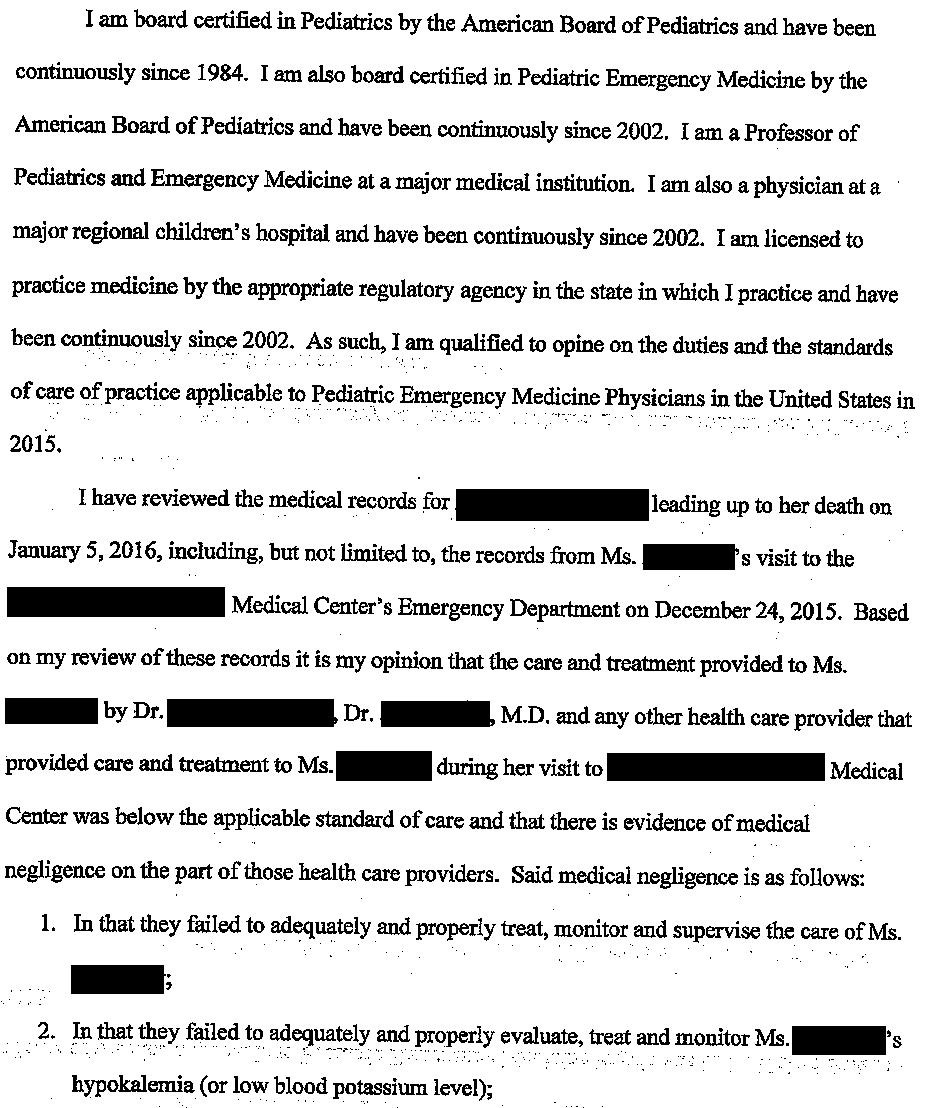
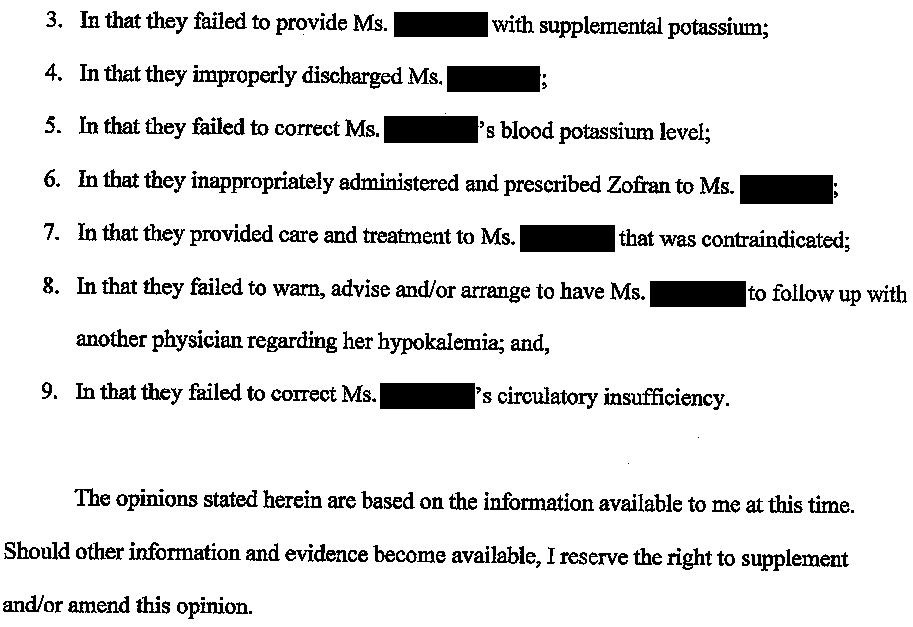

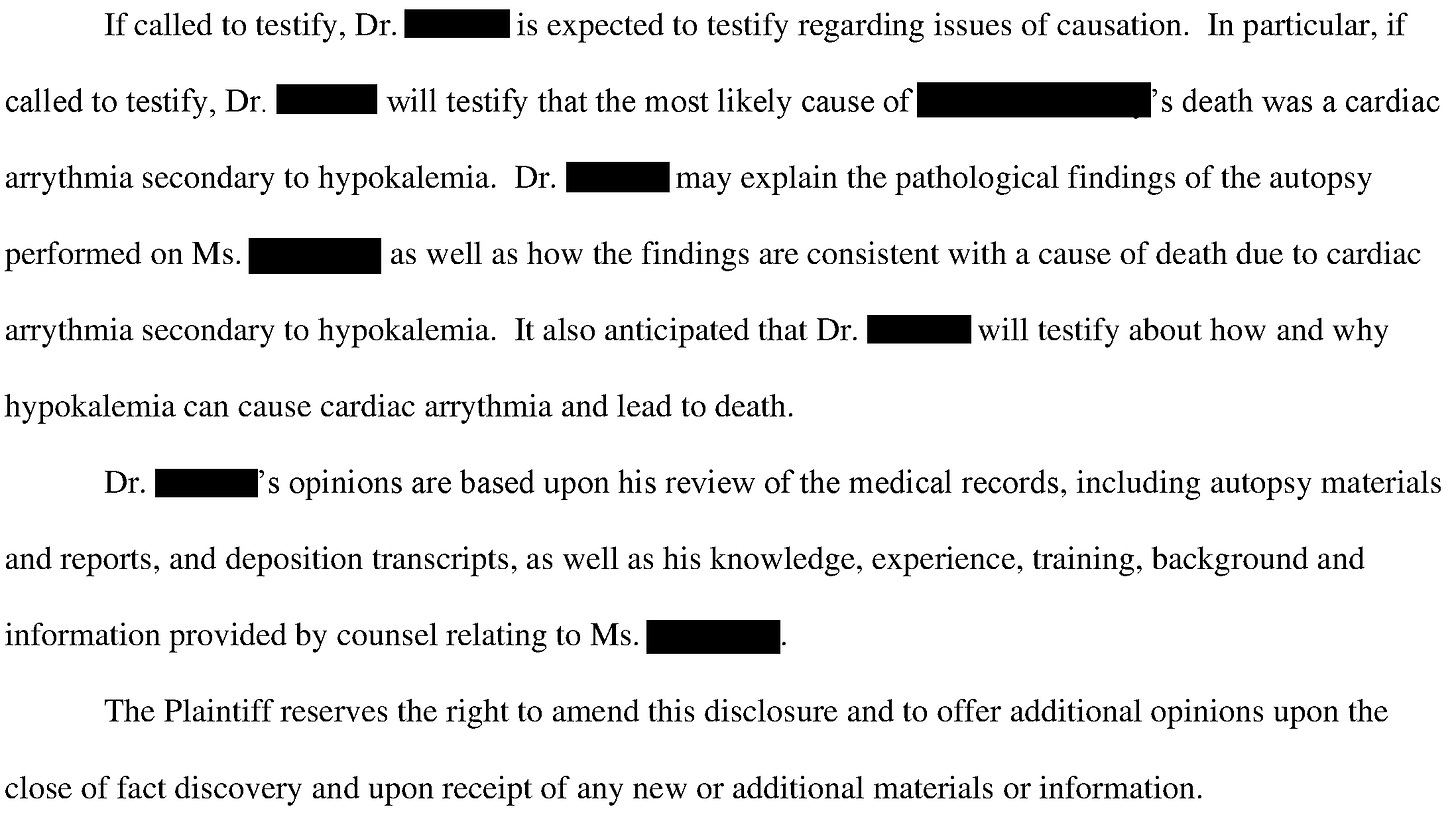
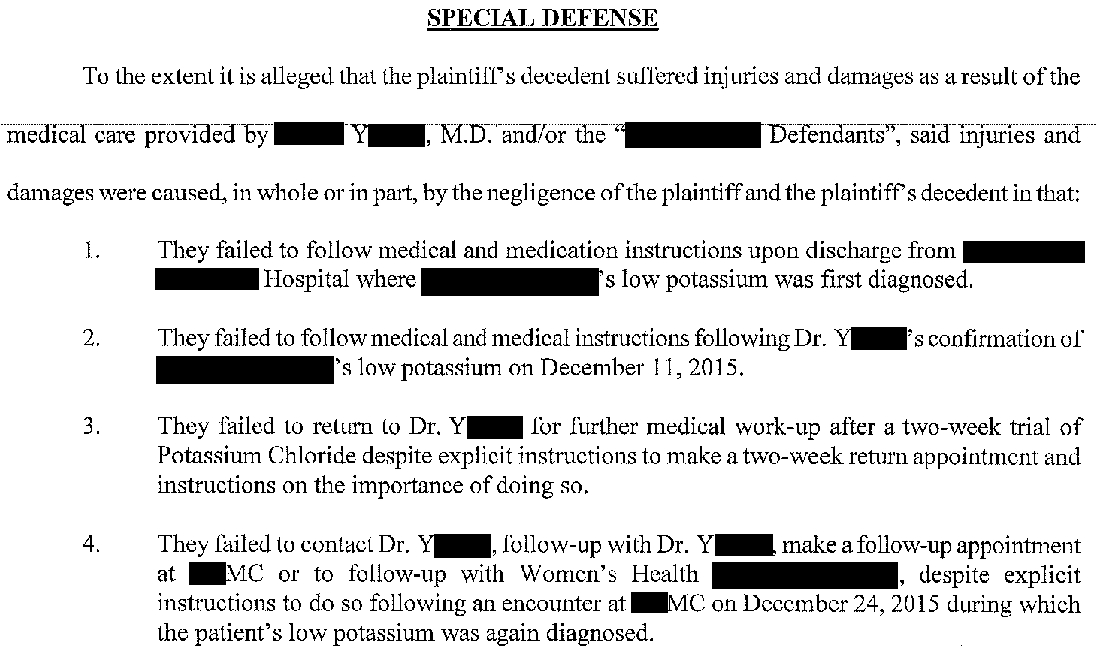
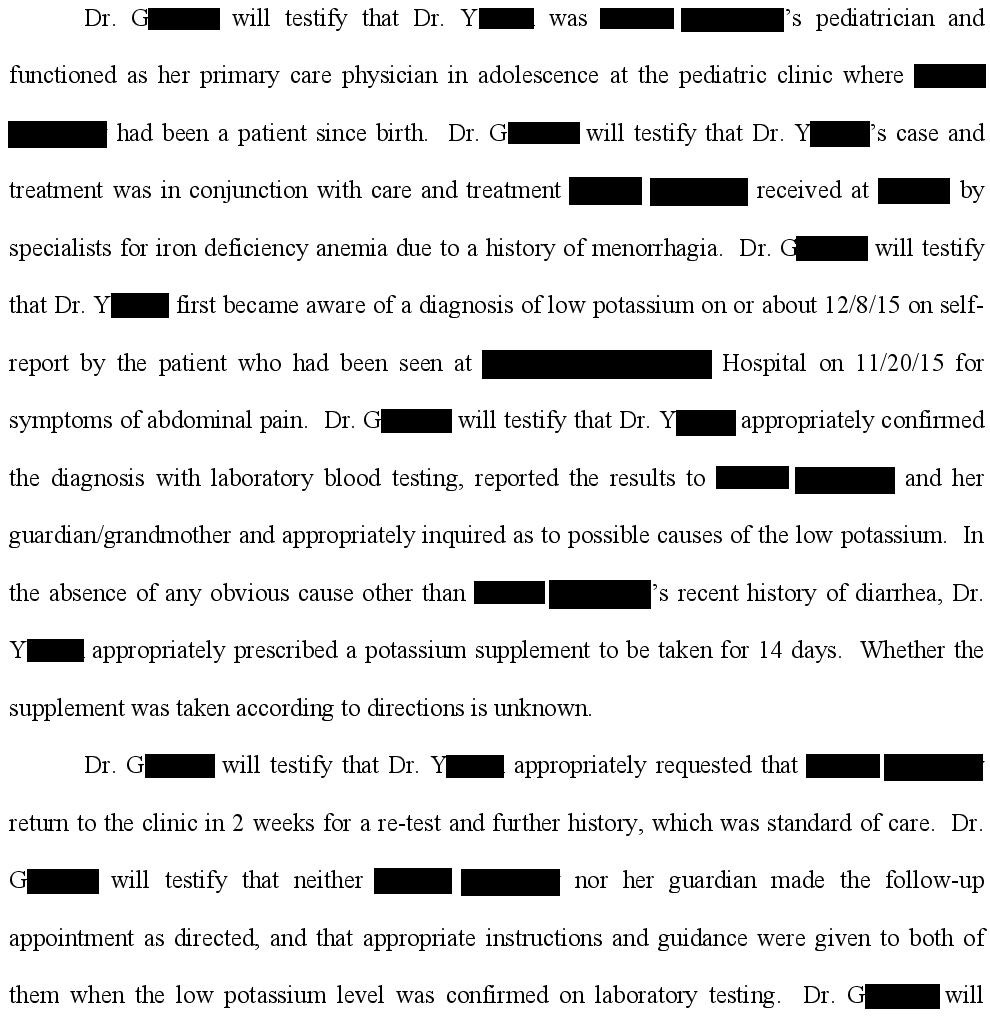
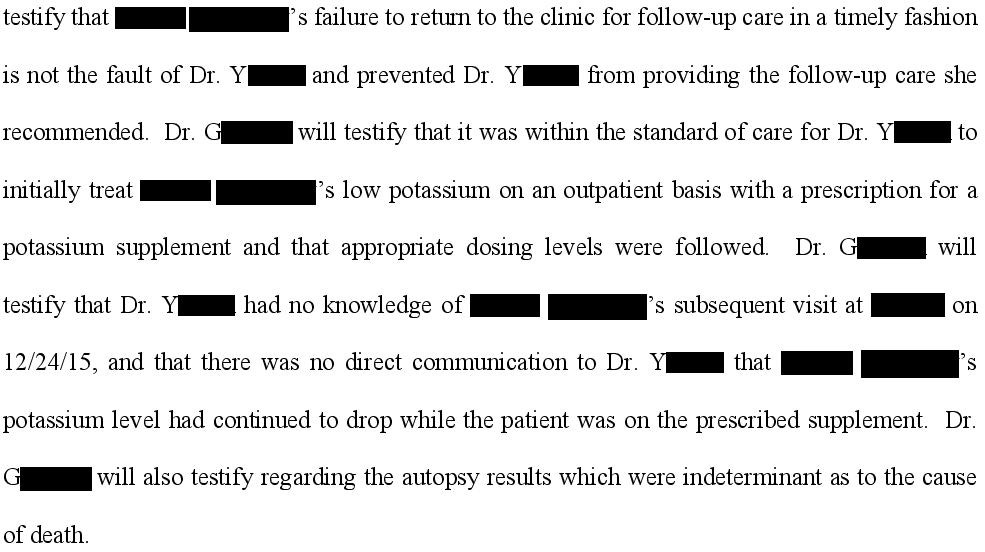

Renal here. This patient should have been admitted. K 2.5 indicates a chronic issue with malnutrition, and therefore a high risk of refeeding syndrome. She needed labs checked at least daily and an evaluation into the underlying cause of the hypokalemia. Throwing more ORAL potassium at a patient with abdominal pain and nausea after it already didn’t work the first time? What was the thought process here? There was a thought process right? Right?
There's finally a pathologist expert witness and I don't get to read anything from them!?